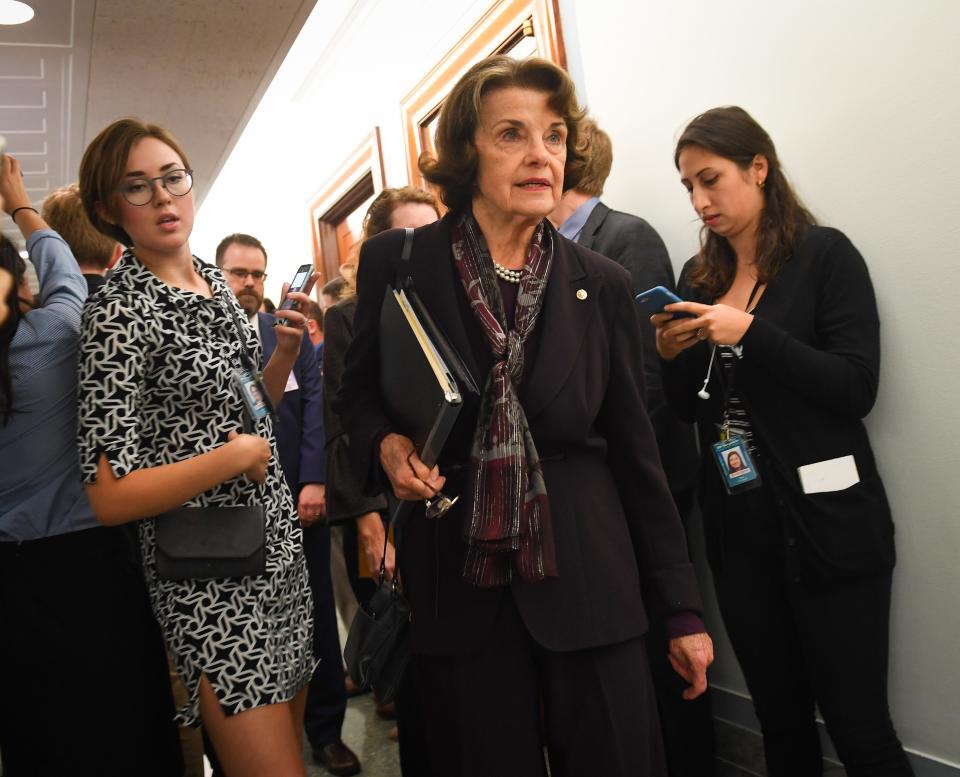Fact check: No evidence Dianne Feinstein helped husband secure a USPS real estate contract
The claim: The firm given exclusive rights to sell U.S. Postal Service buildings is owned by Richard Blum, husband of Sen. Dianne Feinstein
A long-circulating story about Sen. Dianne Feinstein, D-Calif., using her authority in the Senate to help her husband, Richard Blum of CRI, secure a real estate contract to sell off United States Postal Service buildings has resurfaced, and it is only partly true.
A Facebook post by Toby Eber recently breathed new life into the story claiming, “the US has entered into a contract with a real estate firm to sell 56 buildings that currently house U.S. Post Offices. All 56 were built, operated, and paid for by tax-paying American citizens.”
The post says the sale of these buildings will bring in about $19 billion, and that CRI, a company that “belongs” to Feinstein’s husband, Blum, stands to make a large profit as the sole real estate company working the sales.
“Senator Feinstein and her husband stand to make a fortune, estimated at between $950 million and $1.1 BILLION from these transactions,” the post reads.
The post then has links to two previous fact checks, one by Snopes and one by Truth or Fiction.
Eber could not be reached for comment.
More: Feinstein urges McConnell not to reconvene Senate: 'No way to do this without increased risk'
What is the contract?
In 2011, commercial real estate firm C.B. Richard Ellis secured an exclusive contract to market USPS facilities, which included a 2%-6% commission on the sale of the properties, according to Snopes. Blum was the chair of the board of directors of CBRE — not CRI, as the post says — when the contract was signed.
Under the contract, in fiscal 2012, CBRE marketed 49 property sales valued at $118 million, according to a USPS Inspector General’s Office report, in addition to conducting 1,698 lease negotiations.
From the archives: Sen. Dianne Feinstein becomes new target of Trump supporters' 'lock her up' chant
The contract was under intense scrutiny because of Feinstein and Blum’s relationship, but it was also criticized by the USPS Inspector General’s office, not because of the relationship, but because the contract allowed for “dual agency” where CBRE could represent and negotiate for both the Postal Service and the lessors. In 2015, the Inspector General recommended terminating the contract, which at the time both the USPS and CBRE fought against, according to an article in the Hill.
But in 2017, USPS put the contract out to bid again, and this time selected Jones Lang LaSalle Americas Inc, who currently hold the contract.
What did Feinstein and Blum have to say?
In 2013, a Feinstein spokesman provided this explanation to the San Fransico Chronicle, which has been quoted extensively: “Sen. Feinstein is not involved with and does not discuss any of her husband’s business decisions with him. Her husband’s holdings are his separate personal property. Sen. Feinstein’s assets are held in a blind trust. That arrangement has been in place since before she came to the Senate in 1992.”
Then in a response to a HuffPost article about the book “Going Postal” — which is the source of much of the post Eber wrote — her office added, “to be clear, Congress has no role in choosing which real estate services company is retained by the USPS and no decision making role in which post offices to keep open.”
They also pointed to legislation that she voted for that would make it harder to sell post office buildings.

CBRE told the HuffPost that Blum, as the nonexecutive chairman, “plays no role in the day-to-day management of CBRE and has no involvement in our work for USPS.” They also emphasized the competitive bidding process they were a part of to get the contract.
In its review of the claim, Snopes found Feinstein “holds no position in Congress that provides her with any particular control or authority over the U.S. Postal Service.”
They also found that the book “Going Postal” by Peter Bryne, while very critical of CBRE, did not claim that Feinstein helped CBRE secure the contract.
Our ruling: Partly false
The claim does get it right that the company that Feinstein’s husband worked for at the time secured a valuable contract with USPS to sell post office buildings.
However, it gets details, including the name of the company, wrong, and the amount of money being exchanged wrong. It also uses the links to fact checks in a misleading way, as the Snopes one declared it a “mixture,” and the Truth or Fiction one only checked one small part of the claim. CBRE no longer holds the contract making the tone of post misleading. The claims about Feinstein helping to secure the contract for her husband are unsubstantiated.
Our fact-check sources:
Snopes, Did Dianne Feinstein Get Her Husband’s Company a USPS Contract?
Fact Check: Did Sen. Feinstein get a sweetheart deal on post office sales for her husband?
Huffington Post, Dianne Feinstein’s Husband Tied To Questionable Dealings With U.S. Postal Service, Book Says
FactCheck.org, Sen. Feinstein's husband & the postal service
Truth or Fiction, Dianne Feinstein's Husband Brokering Post Offices-Truth!
USPS Office of the Inspector General, Postal Service Management of CBRE Real Estate Transactions
The Hill, Postal Service urged to end deal with real estate broker
San Francisco Chronicle, Grim outlook for post office buildings
East Bay Express, Going postal
Thank you for supporting our journalism. You can subscribe to our print edition, ad-free app or electronic newspaper replica here.
Our fact check work is supported in part by a grant from Facebook.
This article originally appeared on USA TODAY: Fact check: Dianne Feinstein didn't help husband secure USPS contract

